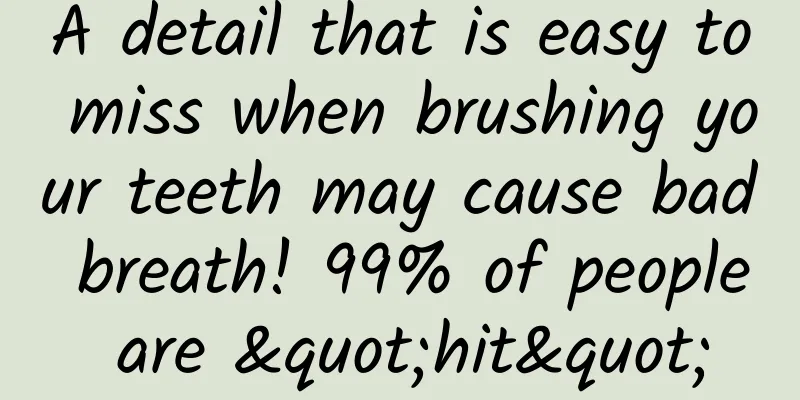A detail that is easy to miss when brushing your teeth may cause bad breath! 99% of people are "hit"

|
March 20 is World Oral Health Day , and this year's theme is "Oral Health for a Healthy Mind and Body". Brushing teeth is a common thing in the morning and evening, but there are many tricks involved. For example, you need to use the "horizontal vibration brushing method" when brushing your teeth. Do not brush horizontally with force, otherwise it may cause gum atrophy and tooth surface wear. After brushing your teeth, you need to use dental floss to clean some places that the toothbrush cannot reach... However, many people may not know that there is one part that must not be missed when brushing your teeth, and that is the tongue . Brushing your teeth and tongue can not only make your mouth clean more thoroughly, but also make your teeth healthier. Brush your teeth without brushing your tongue It may be the culprit of bad breath Why is it so important to brush your tongue when brushing your teeth? We have to first talk about the structure of the tongue. The surface of the tongue is not completely smooth, but has many papillary protrusions, mainly including filiform papillae, fungiform papillae, circumvallate papillae and foliate papillae. Among them, filiform papillae are the most numerous, and their superficial cells are constantly keratinized and shed, mixed with food residues, saliva, bacteria and metabolic products, etc., and attached to the tongue surface, forming what we call tongue coating. Under normal circumstances, the tongue coating is thin and evenly distributed, and is light white in color, which is referred to as "light red tongue, thin white coating". It is one of the signs of oral and digestive system health. Normal tongue coating (thin white coating) The tongue coating is like a quilt covering the tongue. When it is thin, it can protect the tongue mucosa, and it is breathable without affecting the taste and movement of the tongue. However, if this "quilt" is too thick, it will be harmful. Among them, the most direct impact is oral health : 1 Causes bad breath Many studies have shown that abnormal tongue coating is one of the main factors causing bad breath. Too thick tongue coating provides a breeding ground for bacteria, which decompose food residues in the tongue coating and proteins in desquamated epithelial cells to produce volatile sulfides and other odor substances, causing bad breath. 2 Affects taste Too thick tongue coating covers the tongue papillae that sense taste, hindering the contact between taste buds and food, reducing sensitivity to taste, and affecting appetite and eating experience. 3 Increased risk of oral infection Thick tongue coating provides a breeding ground for bacteria, fungi and other microorganisms, which may lead to oral infections such as oral ulcers and Candida infections. 4 Impact on social and mental health Long-term bad breath, loss of taste, indigestion and other problems can seriously reduce the quality of life, affect social interaction, and even lead to anxiety and inferiority complex. Want to clean your tongue safely and effectively? What to do When cleaning the tongue coating, it is very important to be gentle and use moderate force. The tongue coating is like a "small carpet" for the tongue. Proper cleaning can drive away bacteria and debris, but excessive force may hurt the "natives" of the tongue (taste buds and mucous membranes). Specific cleaning process: 1 Tool Selection A tongue scraper or tongue brush is a more recommended choice . Special tools fit the tongue surface better, have high cleaning efficiency, brush cleanly without damaging the mucous membrane, and are effective in controlling bad breath. Tongue scraper. Copyright image from the gallery. Reproduction may lead to copyright disputes. You can also brush gently with a soft-bristled toothbrush, or with the back of a toothbrush with tongue cleaning patterns, but this cleaning effect is not as good as a tongue scraper. 2 How to use When: After brushing your teeth, to avoid toothpaste residue irritating your throat. Strength: Make sure it does not hurt and the tongue surface does not turn red. Don’t scrape until there is no “blood streak effect”! Frequency: Once a day is recommended. 3 Precautions Avoid using excessive force: Using excessive force may cause damage to the lingual papillae and even cause pain or bleeding. Pay attention to the hygiene of cleaning tools: tongue scrapers or toothbrushes should be cleaned after use and replaced regularly to avoid bacterial growth. These situations indicate uncleanness: wounds or ulcers on the tongue surface, abnormally dry tongue coating or obvious cracks, acute inflammation or infection period, abnormal proliferation of tongue papillae (such as black hairy tongue), etc. Observe changes in tongue coating: When cleaning the tongue coating, pay attention to the color, thickness and texture of the tongue coating. If you find any abnormalities (such as the tongue coating is too thick or the color is abnormal), you should seek medical attention immediately. Copyright images in the gallery. Reprinting and using them may lead to copyright disputes. 4 Special Populations Infants and young children: Thick tongue coating may be milk stains. The tongue mucosa is delicate, so just wipe it gently with gauze dipped in water. child: Parents need to assist and choose a tongue brush specially designed for children and use gentle movements. Elderly people: The patient has low saliva secretion, likes to eat soft food, has a thick and dry tongue coating, and may bleed easily due to excessive cleaning. You can use a moist gauze to wipe it gently instead. To sum up, cleaning the tongue coating is like "giving your tongue a SPA" - moderate gentleness is the key. Spend 10 seconds every day scraping it gently, and combine it with a healthy diet and a regular schedule to keep your tongue in "refreshing mode". References [1] Seerangaiyan, K. et al. Tongue coating: its characteristics and role in intra-oral halitosis and general health-a review[J]. Journal of breath research, 2018,12(3), 034001. [2] Van der Sleen et al. The effect of tongue cleaning on breath odour and tongue coating: a systematic review[J]. Int J Dent Hygiene, 2010(8),258–268. [3] Vartul Dwivedi et al. Effectiveness of Various Tongue Cleaning Aids in the Reduction of Tongue Coating and Bacterial Load: A Comparative Clinical Study[J]. The Journal of Contemporary Dental Practice, 2019(20:4),444-448. [4] Matsui et al. Effects of tongue cleaning on bacterial flora in tongue coating and dental plaque: a crossover study[J]. BMC Oral Health, 2014,14:4. [5] Timmesfeld N et al. Mechanical tongue cleaning is a worthwhile procedure to improve the taste sensation[J]. J Oral Rehabil 2021;48:45–54. [6] Vinicius Pedrazzi et al. Tongue-cleaning methods: A comparative clinical trial employing a toothbrush and a tonque scraper[J]. J Periodontol, 2004,75(7):1009-1012. [7] Weng Jinlong, Chen Xiaochi, et al. The role of tongue coating microorganisms in halitosis. International Journal of Stomatology, 2013, 40(5): 625-628. Planning and production Author: Zhao Hechuan Zhuozheng Medical Review|Shi Xiaojun, deputy chief physician, Shanghai Fifth People's Hospital Planning|Yang Yaping Editor|Yang Yaping Proofread by Xu Lailinlin |
Recommend
Causes of fever in early pregnancy
Pregnant women need to pay attention to a lot of ...
What should girls do when they have menstrual period and stomach pain
Every woman may experience abdominal pain during ...
Will I fart a lot during pregnancy?
Some pregnant women will find that they fart sign...
How to prevent and treat stretch marks
The birth of every baby is the hope of every fami...
What to do if pregnant women are prone to oral ulcers
After a woman becomes pregnant, her hormone level...
Why do girls have cold hands and feet?
Many female friends are prone to cold hands and f...
Eight weeks pregnant bloating
For pregnant women, the fetus will continue to gr...
Is uterine cold serious?
It is not difficult to find that in daily life, w...
“Health from Eating” Series | National Fitness Day: How can people who exercise eat scientifically?
...
Leucorrhea after abortion is like tofu dregs
In fact, after a woman has an abortion, it causes...
Six kinds of nutritious dried fruits are the best snack companions for women
In fact, various dried fruits have their own uniq...
Can I get pregnant again after 11 months of cesarean section?
Now, when choosing a cesarean section, you should...
What happens to girls if you have sex too much?
Nowadays, many couples are reunited after a short...
"How many people do you want to kill before you can put down the cigarette in your hand..."
Addendum 1: Do you know why secondhand smoke is m...
What should I pay attention to in my diet when I have leucorrhea that is like tofu and backache?
Leucorrhea with curd-like residue and lower back ...









